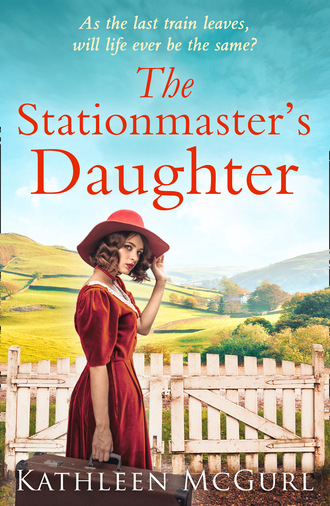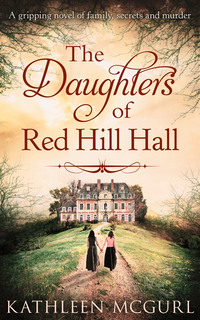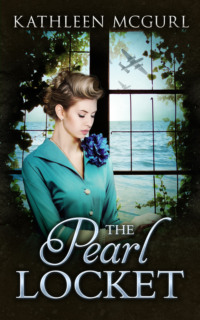
Полная версия
The Stationmaster’s Daughter

About the Author
KATHLEEN MCGURL lives near the sea in Bournemouth, UK, with her husband. She has two sons who are now grown-up and have left home. She began her writing career creating short stories, and sold dozens to women’s magazines in the UK and Australia. Then she got side-tracked onto family history research – which led eventually to writing novels with genealogy themes. She has always been fascinated by the past, and the ways in which the past can influence the present, and enjoys exploring these links in her novels.
After a thirty-one-year career in the IT industry she is now a full-time author, and very much enjoying the change of lifestyle.
When not writing she likes to go out running. She also adores mountains and is never happier than when striding across the Lake District fells, following a route from a Wainwright guidebook.
You can find out more at her website: http://kathleenmcgurl.com/, or follow her on Twitter: @KathMcGurl.
Readers Love Kathleen McGurl
‘I adore McGurl’s time-slip novels’
‘Beautifully written, a real page turner, obviously well researched I found it a fabulous read’
‘A real eye-opener, her best yet, & I have read all Kath McGurl’s books. Loved it!’
‘A clever page turner of a book that will whisk you away’
‘Easily the best book I’ve read so far this year’
‘Absolutely compelling, and a wonderful read’
‘An absorbing, dual-timeline story that packs an emotional punch’
Also by Kathleen McGurl
The Emerald Comb
The Pearl Locket
The Daughters of Red Hill Hall
The Girl from Ballymor
The Drowned Village
The Forgotten Secret
The Secret of the Chateau
The Stationmaster’s Daughter
KATHLEEN MCGURL

HQ
An imprint of HarperCollinsPublishers Ltd.
1 London Bridge Street
London SE1 9GF
First published in Great Britain by HQ in 2019
Copyright © Kathleen McGurl 2019
Kathleen McGurl asserts the moral right to be identified as the author of this work.
A catalogue record for this book is available from the British Library.
This novel is entirely a work of fiction. The names, characters and incidents portrayed in it are the work of the author’s imagination. Any resemblance to actual persons, living or dead, events or localities is entirely coincidental.
All rights reserved under International and Pan-American Copyright Conventions. By payment of the required fees, you have been granted the non-exclusive, non-transferable right to access and read the text of this e-book on-screen. No part of this text may be reproduced, transmitted, downloaded, decompiled, reverse engineered, or stored in or introduced into any information storage and retrieval system, in any form or by any means, whether electronic or mechanical, now known or hereinafter invented, without the express written permission of HarperCollins.
Source ISBN: 9780008331115
E-book Edition © 2019 ISBN: 9780008243906
Version: 2019-07-01
Table of Contents
Cover
About the Author
Readers Love Kathleen McGurl
Also by Kathleen McGurl
Title Page
Copyright
Dedication
Prologue
Chapter 1: Tilly – present day
Chapter 2: Ted – 1935
Chapter 3: Tilly
Chapter 4: Ted
Chapter 5: Tilly
Chapter 6: Ted
Chapter 7: Tilly
Chapter 8: Ted
Chapter 9: Tilly
Chapter 10: Ted
Chapter 11: Tilly
Chapter 12: Ted
Chapter 13: Tilly
Chapter 14: Ted
Chapter 15: Tilly
Chapter 16: Ted
Chapter 17: Tilly
Chapter 18: Ted
Chapter 19: Tilly
Chapter 20: Ted
Chapter 21: Tilly
Chapter 22: Ted
Chapter 23: Tilly
Chapter 24: Ted
Chapter 25: Tilly
Chapter 26: Ted
Chapter 27: Tilly
Chapter 28: Annie
Chapter 29: Tilly
Chapter 30: Annie
Chapter 31: Tilly
Epilogue
Author’s Note
Acknowledgements
Extract
Dear Reader …
About the Publisher
For my brother Nigel
who provided much of the inspiration for this novel
Prologue
For a moment he was frozen, unable to move, unable to react to what had just happened. Time stood still, and he stood with it, not seeing, not hearing, doing nothing.
And then as his senses returned he registered screams of horror, followed by the sight of that broken and twisted body lying at the foot of the stairs. How had it happened? Annie was screaming, lung-bursting screams of pain and terror. His instinct was to rush to her, gather her up and hold her, but would that make things worse? There was no going back now. No returning to how things used to be, before … before today, before all the horrible, life-changing events of the day. It was all over now.
The screams continued, and he knew that the next minutes would alter his life forever. He knew too that even without the broken body, the screams, the fall, his life had already changed irrevocably. The door to a future he had only dared dream of had been slammed shut in his face.
He allowed himself a moment’s grief for what had been and for what might have yet been, and then he shook himself into action, hurrying down the stairs to deal with it all. Not to put it right – that wasn’t possible – but to do his best. For Annie.
Chapter 1
Tilly – present day
It was her dad’s voice that Tilly Thomson could hear, outside the room she’d been sleeping in. Her dad. What was he doing here? She rolled over and buried her face in her Disney Princess pillow. She didn’t want to see him. No, that wasn’t true, she did want to see him – she wanted nothing more than to be scooped up in his strong arms, and for him to take all the pain away. But she didn’t want him to see her like this. Broken, sick, deep in a pit of despair. No parent should see their child in this sort of state. Even if that child was 39.
There was a tap at the door, and then Jo entered. Jo was Tilly’s best friend, the person who’d saved her life and given her a place to stay. She’d moved her two little daughters into one room to make space for Tilly, after she was discharged from hospital.
‘Tils? Your dad’s here.’ Jo stepped into the room, her face taut with worry. ‘I know you said you didn’t want to worry him, but listen, mate, he’s your dad. So I phoned him. Don’t be cross at me. Let him help.’
Before Tilly could summon the energy to answer, Jo stepped aside and Tilly’s dad, Ken, entered the room. He looked stressed, much older than when she’d last seen him. That would be her fault, she supposed.
‘Hey, Dad,’ she managed to croak.
‘Oh, pet. What’s up? Jo said you were in a bad way?’ He looked about for a place to sit down, and pulled out a small stool upholstered in pink to perch on.
‘I’ll, um, leave you two to talk,’ Jo said. ‘Did you want a cup of tea, Ken?’
‘Thanks, Jo. I’d love one.’
Jo closed the door quietly behind her. Tilly took a deep, shuddering breath, and closed her eyes. The pain on her father’s face was too much to bear.
‘What’s up?’ he said again, his voice hoarse. He was fighting back tears, she realised.
‘Just … all got a bit much for me, I suppose,’ she whispered. She couldn’t tell him the whole truth. Not now. Not yet.
‘You should have talked to me! I’d do anything for you, you know that, pet? Jo said you were … having a breakdown of some sort. God, when I heard …’
Tilly didn’t want to think about how he’d have felt. A pang of guilt coursed through her, adding to the pain, pushing her deeper into that dark pit of misery. ‘Sorry, Dad. I … didn’t want you to be worried.’
‘Of course I worry. Just want my girl to be happy again.’
She forced a weak smile to her face and reached for his hand. Her lovely dad, just trying to do what was best for her. But he wouldn’t be able to fix everything. ‘I know you do. Thanks.’
‘Look, pet, we have a bit of a plan. I think you should come home with me. Down to Dorset. I’ll sort out the spare room for you, and then you can rest and relax as much as you need. Jo’s been so good, but you can’t stay here forever. She’s got her own family to look after.’
Tilly tried to imagine life with her dad in his bungalow by the sea. He’d lived on his own since her mum died nearly three years ago. He spent all his spare time helping with the restoration of an old railway. He’d probably try to get her involved in it too, but right now, she couldn’t imagine doing anything other than lying in bed, under a thick duvet to insulate her from the rest of the world.
‘It’ll be good for you, pet. Sea air. The views from the cliff top. Getting away from London and all … everything that’s happened.’
‘He’s right, Tils.’ Jo had come back in with a couple of mugs of tea. She handed one to Ken, put the other on a bedside cabinet then perched on the end of the bed and took Tilly’s hand. ‘Listen, mate, you know you can stay here as long as you want. I’m not chucking you out. But have a think about it. New surroundings, living by the coast in Coombe Regis, a slower pace of life a long way from Ian and the rest of it. Might help get your head straight.’
‘I’m not sure it’ll ever feel straight again,’ Tilly said, but regretted it when she saw Ken wince. He didn’t know all of it. Unless Jo had told him.
‘It will, in time. Believe me.’ Ken put his tea down on a plastic toy crate and slid to his knees beside the bed. ‘Come here, pet. Let your old dad give you a cuddle. Can’t promise to make it all better in one go, but the Lord knows I’ll give it my best shot.’
And then he scooped her up into a sitting position, wrapped his arms around her and held her tight. Tilly held on to him, letting his strength seep into her, resting her head against his shoulder and finally giving in to the urge to cry – huge, ugly sobs that shook her body and wracked her soul, but which somehow he seemed to absorb, so that when she finally calmed herself and pushed him gently away, she felt just a tiny bit better, just a touch more able to face the world. Perhaps he and Jo were right. Perhaps a stay on the Dorset coast with Ken would help. It certainly couldn’t make her feel any worse.
*
Ken slept on Jo’s sofa for the next two nights, until Tilly felt ready to face the journey. She felt scared to leave the cocoon of Jo’s house, that comforting little pink bedroom in which she felt like a child being cosseted as she recovered from a bout of chicken pox. But 5-year-old Amber deserved to have her bedroom back.
At last it was time to leave. After dropping her kids off at school and nursery, Jo had made a trip to the house Tilly had once shared with Ian, and filled a suitcase with clothes. ‘I picked up mostly jeans, T-shirts, fleeces,’ she said. ‘I guessed you wouldn’t want your smart work clothes. If you need anything more I’ll go and fetch it, and bring it when I come to visit.’ She hugged Tilly. ‘Which won’t be too many weeks away, I promise.’
Tilly’s eyes filled with tears. Jo had been such a good friend to her through all this. There was no way Tilly could have faced returning to her old marital home to pack, even when Ian wasn’t there. And although Ken had offered, Jo had insisted he stay with Tilly rather than risk a confrontation with his son-in-law, which would almost certainly end badly. ‘Thanks, Jo. I can always buy anything else if I feel I need it.’ Though right now all she felt she’d need was a few pairs of warm pyjamas and maybe a dressing gown.
With effort, she dragged herself into the shower, washed her hair, and dressed in some of the clothes Jo had fetched. When she came downstairs, she found her father and Jo sitting in the kitchen, talking seriously. About her, no doubt. They cared, she reminded herself, even if she no longer cared about herself.
‘There you are. You look better for having that shower,’ Jo said, with a smile. ‘Cup of tea before you go?’
Tilly shrugged. Recently she’d found it impossible to make even the simplest decision. Ken put out a hand to her and squeezed her arm. ‘Thanks, Jo, but I think we’ll get going. It’s a longish drive, and I want to get home before the evening rush hour. Ready, pet?’
She nodded, numbly, and allowed him to shepherd her out to the car. Jo gave her a hug. ‘Look after yourself, Tils. Listen to your dad. Do whatever he suggests, promise me. I’ll be down to see you in a couple of weeks, I promise. Love you, mate.’
‘Thanks, Jo,’ Tilly managed to say. The words seemed inadequate, but the effort required to find more was too much. She climbed into the car, put on her seat belt and leaned back against the headrest. Outside, Ken was hugging and thanking Jo, and loading his bag and Tilly’s suitcase into the boot. And then he was in the driver’s seat beside her, starting the engine, and they were on their way, leaving Jo standing on her driveway, dabbing at her eyes with a tissue. Even Ken’s eyes looked suspiciously moist. Far too much crying was going on, Tilly thought, and all of it her fault. But right now, she didn’t feel she could do anything about it.
*
The journey passed uneventfully. Ken found a classical music station on the radio, and Tilly let the music wash over her as she stared out of the window at the passing countryside. It was February, the fields were brown and bare and the sky was a dismal grey. The scenery and weather were a perfect match for her frame of mind. Soon it would be spring, there’d be new growth in the fields and hedgerows, birds would sing and lambs would be born, and everyone would look forward to the warmth of summer. Would she? Was there anything to look forward to? She’d lost her job, her husband, her chances of having a family. But now she was here, with her dad, and somehow she had to find a way forward.
She knew she shouldn’t dwell on these thoughts. All it did was make her more miserable. She fumbled in her jeans pocket for a crumpled tissue, but it wasn’t enough to soak up her never-ending tears. Ken glanced over, then rummaged in his pockets and pulled out a cotton handkerchief. ‘Here, pet. It’s clean, and it’ll be easier on your skin than those tissues.’
She took it gratefully. The cotton was soft from having been washed hundreds of times. It had been folded in four and ironed, just the way her mum always used to iron handkerchiefs. An image of her dad standing over the ironing board, carefully ironing and folding hankies flitted through her mind, and despite her misery she found herself smiling faintly.
‘That’s better, pet. Breaking my heart to see you so upset. When we get home I’ll make up the spare bed for you. Then I’ll make us shepherd’s pie for tea. You always loved your mum’s shepherd’s pie. I’ve learned to cook since she … went.’ He bit his lip. ‘I’ve had to.’
Tilly reached out to pat his shoulder. Dad had never cooked so much as beans on toast the whole time she was growing up. Mum had done everything. When she died, Tilly had wondered how he’d cope on his own, but she’d been so caught up in her own problems at that time that she’d never asked. To her shame, she realised this was her first visit to Dorset since the funeral. And this wasn’t so much a visit – more like a rescue.
‘Thanks, Dad. Looking forward to it.’ Looking forward. Well, it was a start.
The roads became narrower and more twisty as they drove deep into Dorset. Not far from Coombe Regis Ken slowed down as they passed through a village. ‘That’s Lynford station house,’ he said. ‘The first station the restoration society bought. We’ve laid some track here and we’re open at weekends and school holidays, running trains up and down.’ Tilly glanced across at the building he was indicating, and saw a sign: Lynford station: Home of the Michelhampton and Coombe Regis Railway.
‘Is that where you spend your time?’ she asked.
He nodded. ‘Well, there and Lower Berecombe, which is the next station on the line. Actually, I’m usually at Lower Berecombe. We’ve not owned it as long, and there’s more to do there. Anyway, I’ll give you a tour of both as soon as you feel up to it.’
She forced herself to smile at him, then stared out of the window in silence for the remainder of the journey. Thankfully they were soon in the outskirts of Coombe Regis. She’d been here before – her parents had bought their cliff-top bungalow after they retired, and she and Ian had visited a few times.
Ken drove down a steep street that she remembered, that led straight down to the tiny harbour in the heart of the little town. There, they turned right, past some shops and a small beach, and then through a residential area, heading uphill once more to the cliffs on the west side of town. This part was familiar from her previous visits, and soon they turned into her dad’s driveway and she saw the stunning view across the cliff top to the sea. Even with the low grey cloud and sporadic rain, it was beautiful.
‘Here at last, then, Tillikins!’ Ken jumped out and began unloading the luggage from the boot.
‘Great,’ she replied, turning away. His use of her old childhood nickname had made her eyes prickle with tears.
She got out of the car and followed Ken inside. It was exactly as she remembered it – exactly as it had been when her mother was alive. A small table stood by the front door, with an overgrown spider plant on it, its offspring dangling down to floor level. Her mother’s deep-red winter coat still hung from a hook in the hallway, and as she passed, Tilly reached out to caress it.
‘I should send that down to the charity shop, I suppose,’ said Ken, noticing her action.
‘Not if you’re not ready to,’ she replied, and the way her dad turned quickly away told her he wasn’t.
‘Go on into the sitting room,’ he said. ‘Give me ten minutes to sort out a bedroom for you.’
She did as he said and sat on a sofa that was angled to make the most of the view of the cliff top and sea. There was something calming about resting your eyes on a distant horizon, she thought. It would help, being here.
A few minutes later Ken came back. ‘So, you’re in this room,’ he said, leading her along the corridor and into the guest bedroom, the same one she’d stayed in before with Ian, but her father had decorated it since she’d last been here. It had a double bed with crisp white bed linen, pale-blue painted walls that on a good day would match the sky outside, a dark oak chest of drawers and a chair upholstered in vibrant blues and greens. The floor was a pale laminate, with a fluffy cream rug beside the bed. The whole effect was restful and calming. Ken had put her suitcase on a low table and laid a blue-and-white striped towel on the end of the bed.
Tilly felt tears come to her eyes again. ‘Thanks, Dad. This is really nice.’
‘I tried to think of what your mother would have done, and did the same,’ he said.
‘She’d be proud of you.’
‘Thanks, pet.’ A gruffness in Ken’s voice betrayed his usual discomfort with emotional scenes, so Tilly said no more, but set to work pulling clothes she had out of the suitcase, putting her wash bag on the chest of drawers and tucking her pyjamas under the pillow.
‘Right then, a cup of tea, and then dinner in about an hour?’
‘Got anything stronger? I feel the need … well, it’s been a long day.’
Ken nodded. ‘There’s some wine, but are you sure, after—’
‘I’m fine. I won’t overdo it.’
A few minutes later, with a glass of buttery Chardonnay in her hand, Tilly was standing by the picture window in the bungalow’s sitting room, gazing at the view. The rain was beginning to clear, and dusk was falling. To the west, over the sea, there was a strip of clear sky, turning ever deeper red and purple as the last of the light faded. There was a path along the cliff behind her father’s garden.
‘Did Jo pack your walking boots or a pair of trainers? It’d be good for you, to get out there and walk along the cliffs. Helps put things in perspective. Well, it helped me, after … you know.’ Ken had come to stand beside her, watching the sunset.
‘Yes, maybe I will. Some day.’ Tilly topped up her wine. Right now, the only thing she wanted was to drink enough to blot out the world and then crawl under a duvet.
Chapter 2
Ted – 1935
Ted Morgan, the stationmaster at Lynford station, had reached the not-insignificant age of 40 years without believing in love at first sight. Indeed, he wasn’t sure he believed in love at all; that is to say, not the romantic variety. You loved your parents, your siblings, and children (if you had any), of course. And you could be infatuated by a member of the opposite sex. But romantic love was a notion he’d had no experience of, and therefore was disinclined to believe in.
Until, that is, he’d first laid eyes on Annie Galbraith, and love – he could not call it anything else – hit him between the eyes with all the force of a Manning Wardle 2-6-2 tank engine.
Annie was slim, shorter than him by a foot, blonde of hair and blue of eye, her face shaped like a perfect heart. She held her head high as if to make herself taller, giving the impression of someone who was superior, as she was to him, in every way. She arrived each morning on the 08.42 from Michelhampton, strode purposefully through Ted’s little branch-line station with a neat black handbag hooked over her arm. In the evenings she returned three minutes before the 17.21 was due to depart. She sat in first class – where else for such a goddess? – in a seat on the left-hand side, one which afforded the best views across the Dorset countryside, on the forty-minute journey to Michelhampton. She had been travelling on these trains every weekday for the past four months, and in all that time he had only ever said three words to her. The same three words, over and over. In his head they were, ‘I love you’, but they came out of his mouth as ‘Thank you, ma’am,’ when he inspected her ticket each day. The weekly ticket that, he knew, she bought from the ticket office at Michelhampton, from the lucky, lucky clerk there, who had the pleasure of the longer and more involved interaction associated with purchasing a ticket.
Still, gazing at the ticket, holding it when it was still warm from her own fair hands (that were sometimes encased in soft leather gloves, though not now that the season had progressed towards spring), was a thrill in itself. And then, when he’d completed his check, he could raise his eyes to hers, smile, and say those three words, and she’d nod and take the ticket from him, then turn and hurry onto the platform where the train was waiting. Once, she almost smiled back at him. Twice, she’d said thank you. And on another occasion, when she was a minute or so late, he’d held the train and ushered her onto it as she scurried through the station, her heels clip-clopping on the station’s tiled floor. He’d waved her away as she reached for her ticket, and she’d smiled for sure that time before wiping the back of her hand across her brow as she boarded the train as if to say phew! Thank goodness she’d made it, and all thanks to Ted!








